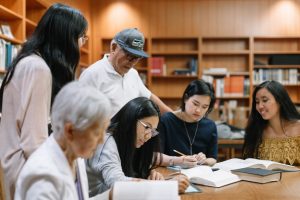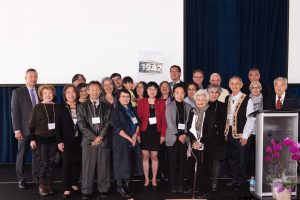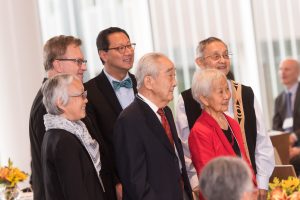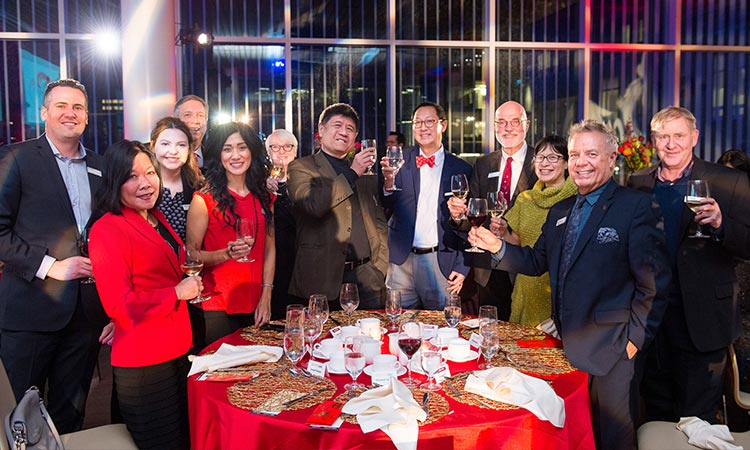In 2007, UBC was petitioned to pay tribute to the Japanese Canadian students who were unable to complete their studies at UBC due to the 1942 internment. Members of Vancouver’s Japanese Canadian community went to the media and began what could have become a major public relations incident. As many Universities throughout the U.S. had already honoured Japanese American students with honorary degrees, UBC was perceived as being unresponsive and not living up to its commitment to human rights.
In 2012, UBC attempted to create a meaningful tribute for the 76 Japanese Canadian students who had been detained and exiled from British Columbia during WWII. UBC recognized the students through the conferral of degrees in a memorable ceremony that took place in May of that year. In addition, the University determined that it was important to create an ongoing legacy through the creation and preservation of the students’ oral histories, the digitization of a unique copy of a Japanese Canadian newspaper, and also the development of an Asian Canadian academic program. The University Japanese Canadian Tributes Committee, which handled the commemoration, included faculty and staff who had worked with the Japanese Canadian community on previous occasions.
While these individuals had previously worked on fruitful and meaningful projects with the community, working together as a group yielded far greater results. The Tributes Committee members were able to draw from each others’ expertise and their community networks and also pool financial resources in order to create a substantial impact. The Japanese Canadian Students of 1942 as well as other community members recognized these efforts by the University by later giving to a fund to ensure that these activities will be sustained into the future.
The ACCE hopes to build on this experience and aims to fulfil substantial, long-term achievements by creating a collaborative framework for Asian Canadian community engagement across the University.
Additional Positive Outcomes of Intentional and Respectful Asian Canadian Engagement:
The Japanese Tribute response is an example of a process that did go well when expertise and relationships were valued – the experience effectively repaired the community’s loss of trust in UBC during the four years it took for UBC Senate to pass its motion regarding the tribute. The pre-cursor to the ACCE Initiative raised the legitimacy and visibility of academic and community engagement with local Asian Canadian communities (in particular, the Japanese Canadian community), by working to establish the Asian Canadian & Asian Migration Studies (ACAM) program as a legacy of this ceremony.

On Tuesday, October 10, 2017, the ACCE committee organized a public event titled the “UBC Day of Learning,” which engaged over 500 students, staff, faculty, and community members to mark the 75th anniversary of Japanese Canadian internment and the 5th anniversary of the UBC Honorary Degree Ceremony for the 76 Japanese Canadian students expelled in 1942.


Lunar New Year luncheon: This luncheon was a development idea that came out of former president Stephen Toope’s first term. Over the years, feedback from community participants was that the luncheon lacked a clear purpose. With the help of ACCE Committee members, the formal event was significantly improved. From encouraging the President to connect with diverse community members, to informing and curating an appropriate guest list, the ACCE Initiative supported the University in engaging respectfully with donors, alumni, and community members.

Asian Centre Strategy: In the fall of 2015, the ACCE Initiative was tasked by the Faculty of Arts and the UBC Library to provide recommendations on a capital renovations project of the Asian Centre. These discussions have moved from defining a physical space or “Asian” district to the concept of “infrastructure”: community protocols, processes, facilities, basic physical & organizational structures, systems, principles (both place and the non-physical).
ACCE partnered with the National Association of Japanese Canadians, the Nikkei Centre, and S.U.C.C.E.S.S. to host an Asian Canadian Elder Care Summit in May 2015. By connecting different community leaders on pertinent, cross-cultural issues, ACCE was a neutral broker in facilitating a conversation that has united local Asian Canadian communities, while leveraging UBC expertise.
UBC Centennial: The Initiative coordinated a cross-campus, $80,000 project titled “It’s About Time”4 to reflect on the University’s past, present, and future. This was a historic opportunity for the University to articulate what it aspired to become vis-à-vis our place in Vancouver, Canada, and North America, as part of a gateway to Asia.
Through the ACCE Initiative, we have built strong connections between different UBC units in research, teaching, engagement, development contexts (coordination of calendars, events, and joint initiatives, etc.)